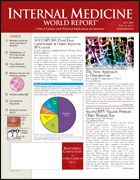Publication
Article
Lifelong Vegetarianism Can Reduce Colorectal Cancer Risk
Author(s):
By Bruce Sylvester
WASHINGTON, DC—If any of your patients is among the people who have made vegetarianism a lifelong habit, he or she now has another reason for continuing this lifestyle. Lifelong vegetarianism is strongly correlated with a reduced risk of colorectal cancer, investigators reported at Digestive Disease Week.
IMWR
"In this large study we see new data that lifelong vegetarianism does indeed protect human beings against colorectal cancer, possibly even preventing it," coinvestigator Yogesh Shastri, MD, told .
This study included prospective data from 9191 patients in India who were managed in a clinical nutrition service from January 2000 through December 2005. A dietary history was obtained from all participants.
India presents a unique opportunity for researchers, where about one fourth of the population practices lifelong vegetarianism for religious reasons. "Since vegetarianism in India tends to be about religion, and therefore lifelong—not a faddish, start-and-stop behavior—this gives added weight to the credibility of our findings and conclusions," said Dr Shastri, who was affiliated with Tata Memorial Hospital, Mumbai, India, when this study was conducted, and is now clinical fellow at the Johann Wolfgang Goethe University Hospital, Frankfurt, Germany.
Individuals diagnosed with colorectal cancer (n = 796) made up the primary patient cohort. Three groups of controls were used in separate comparisons with the colorectal cancer cohort: patients with noncolorectal cancers (control group 1; n = 7273), patients with noncolorectal cancer and tobacco-related cancers (control group 2; n = 1844), and patients with benign disorders (control group 3; n = 74).
A total of 27% (n = 2092) of the patients from the control cohorts were lifelong vegetarians, as well as 22.4% (n = 178) of the patients already diagnosed with colon cancer.
Standard multivariate analysis of the data from 7641 patients was adjusted for age, gender, body mass index (BMI), and economic status.
P
Results showed that lifelong vegetarianism was significantly ( <.05) associated with the following factors: age >65 years, male gender, BMI <20 kg/m2, and economic deprivation.
Colorectal cancer was positively associated with old age and male gender but was significantly and inversely associated with low BMI and economic deprivation.
P
P
The most notable finding was the inverse correlation between colorectal cancer and lifelong vegetarianism ( = .000 for control groups 1 and 2; = .113 for control group 3).
"More research is needed to definitively establish the case for lifelong vegetarianism as a colorectal prevention strategy, but we see strong signs in this study that this is indeed the case," said Dr Shastri.
Session moderator Alan Buchman, MD, associate professor of medicine at the Feinberg School of Medicine of Northwestern University in Chicago, added a note of caution.
IMWR
He told , "This study suggests the potential importance of diet in the prevention of colorectal cancer, wherein a modest decrease in the presumed risk of colorectal cancer was observed in individuals that had consumed a lifelong vegetarian diet for religious reasons. However, family history, as well as other nontobaccorelated lifestyle differences, were not ascertained."
He added that "the risk of colorectal cancer in vegetarians will need to be compared with healthy nonvegetarians, rather than with patients with other medical illnesses, before any definitive conclusions can be made."






